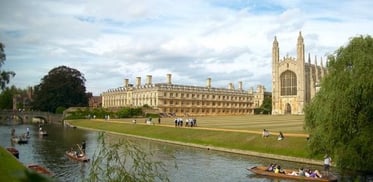CAE Geometry Workshop
Held 14-15 September 2017 in Cambridge, England
 CAD has for decades been the focus of engineering geometry. Based on the research in the Cambridge University Computer Lab in the 70’s by Ian Braid and colleagues, both Parasolid and ACIS emerged as kernels in many of today’s CAD systems. These are all NURBS based, so-called, solid modellers. With constraint management, direct modelling and fast computing, artefact design has gone wonderfully organic. But to ensure such artefacts are fit for purpose, physical simulation is required to check their behaviour in the domains of strength, heat, fluid flow, electro-magnetics. Hence the wide development of discrete representations that enable computation of these simulations, based on the CAD geometry (FEA, CFD, CEM etc).
CAD has for decades been the focus of engineering geometry. Based on the research in the Cambridge University Computer Lab in the 70’s by Ian Braid and colleagues, both Parasolid and ACIS emerged as kernels in many of today’s CAD systems. These are all NURBS based, so-called, solid modellers. With constraint management, direct modelling and fast computing, artefact design has gone wonderfully organic. But to ensure such artefacts are fit for purpose, physical simulation is required to check their behaviour in the domains of strength, heat, fluid flow, electro-magnetics. Hence the wide development of discrete representations that enable computation of these simulations, based on the CAD geometry (FEA, CFD, CEM etc).
Generating these discrete meshes or grids from CAD geometry has been a frustrating business.
Consequently, it is now widely accepted that engineering simulation needs a variant of the CAD geometry, which is becoming known as CAE geometry.
During 14-15 September 2017, ITI ran a workshop on CAE Geometry to bring together those working in this field: end users, academics and vendors.
To encourage a full exchange of ideas, the workshop was an informal event with no published proceedings, with attendees able to present last minute results. Each presenter decided whether to distribute any presentation material. The presentations which have been provided are available via the links below.
Our earlier Medial Object Workshop, held in Cambridge October 2014 is similarly accessible here: http://info.iti-global.com/medial-object
2017 Workshop Papers
Most papers are provided below via the links in the titles. Dr Hugh Hunt’s presentation was an informal, after dinner entertainment talk – his website offers links to many of his popular talks: http://www2.eng.cam.ac.uk/~hemh1/tv.htm
|
Dr Geoff Butlin |
ITI Global in Cambridge |
|
|
Mark Gammon |
ITI Global in Cambridge |
|
|
Industrial Perspectives on Geometry Handling at Airbus Flight Physics |
Dr S Crippa |
AIRBUS |
|
Dr T Robinson |
Queen’s University Belfast |
|
|
EM modelling challenges |
Dr C Jones |
BAES |
|
CAE Geometry for Electromagnetic Simulations |
B Neufeld |
Electro Magnetic Applications |
|
H Bucklow |
ITI Global in Cambridge |
|
|
Dr T Blacker |
Sandia Labs |
|
|
Professor A Kim |
Cardiff University |
|
|
Dr X Zhou |
Cardiff University |
|
|
Capacity-constrained optimal domain decomposition using power diagram |
Professor Wenping Wang |
University of Hong Kong |
|
Dr R Sevilla |
University of Swansea |
|
|
Progress in Exascale-Era Parallel Mesh Generation and Adaptation |
Professor N Chrisochoides |
Old Dominion University |
|
Ed Green |
Rolls Royce plc |
|
|
Joe Walsh |
Intrinsim |
|
|
Geometry-handling challenges for aerodynamic simulation: perspectives from MBDA |
Dr Nigel Taylor |
MBDA |
|
Lightweight CAD engine for (eventual) direct use in CFD software |
J P Steinbrenner |
Pointwise Inc |
|
Professor M Price |
Queen’s University Belfast |
|
|
3D Delaunay Meshing of NURBS Models through Matrix Representations |
Come Le Breton |
INRIA |
|
Feature extraction from random cutting planes in a CAD mesh model |
Dr Ramanathan Muthuganapathy |
Indian Institute of Technology Madras |
|
IGA and electromagnetic analysis, multiscale geometries |
Dr Robert Simpson |
Glasgow University |
|
Exploiting IGA for tightly integrating CAD with marine hydrodynamic Solvers |
Professor P Kaklis |
University of Strathclyde |
|
Dr J Kosinka |
University of Gronnigen |
|
|
Adaptive Splines within an Industrial Environment |
Dr D Grossman |
MTU Aero Engines GmbH |
|
Dr Malcolm Sabin |
Numerical Geometry Ltd |
|
|
Workshop sum-up plus general discussion |
Dr Nigel Taylor |
MBDA |
Please complete the form on this page if you are interested in receiving more information about ITI’s CAE Geometry tools.